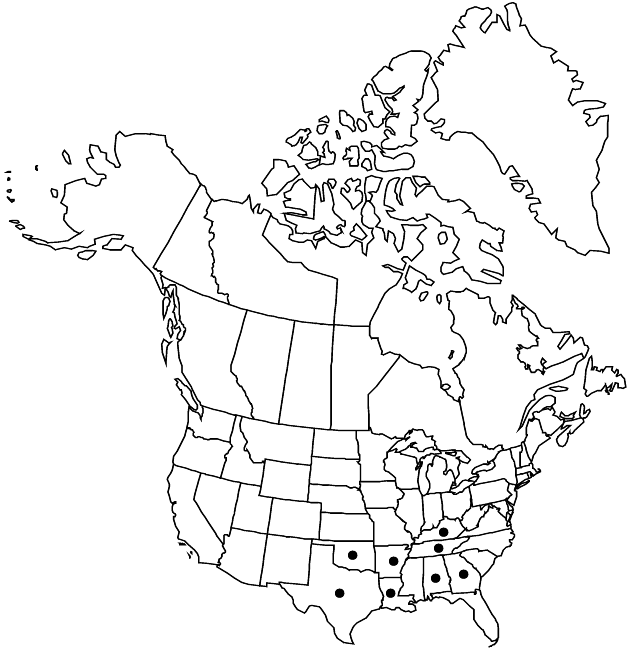Difference between revisions of "Prenanthes barbata"
Brittonia 29: 223. 1977.
FNA>Volume Importer |
imported>Volume Importer |
||
| (3 intermediate revisions by 2 users not shown) | |||
| Line 8: | Line 8: | ||
}} | }} | ||
|common_names=Barbed rattlesnakeroot | |common_names=Barbed rattlesnakeroot | ||
| + | |special_status={{Treatment/ID/Special_status | ||
| + | |code=E | ||
| + | |label=Endemic | ||
| + | }} | ||
|basionyms={{Treatment/ID/Basionym | |basionyms={{Treatment/ID/Basionym | ||
|name=Nabalus fraseri var. barbatus | |name=Nabalus fraseri var. barbatus | ||
|authority=Torrey & A. Gray | |authority=Torrey & A. Gray | ||
| + | |rank=variety | ||
|publication_title=Fl. N. Amer. | |publication_title=Fl. N. Amer. | ||
|publication_place=2: 481. 1843 | |publication_place=2: 481. 1843 | ||
| Line 17: | Line 22: | ||
|name=Prenanthes serpentaria var. barbata | |name=Prenanthes serpentaria var. barbata | ||
|authority=(Torrey & A. Gray) A. Gray | |authority=(Torrey & A. Gray) A. Gray | ||
| + | |rank=variety | ||
}} | }} | ||
|hierarchy=Asteraceae;Asteraceae tribe Cichorieae;Prenanthes;Prenanthes barbata | |hierarchy=Asteraceae;Asteraceae tribe Cichorieae;Prenanthes;Prenanthes barbata | ||
| Line 41: | Line 47: | ||
-->{{#Taxon: | -->{{#Taxon: | ||
name=Prenanthes barbata | name=Prenanthes barbata | ||
| − | |||
|authority=(Torrey & A. Gray) Milstead ex Cronquist | |authority=(Torrey & A. Gray) Milstead ex Cronquist | ||
|rank=species | |rank=species | ||
| Line 55: | Line 60: | ||
|publication title=Brittonia | |publication title=Brittonia | ||
|publication year=1977 | |publication year=1977 | ||
| − | |special status= | + | |special status=Endemic |
| − | |source xml=https:// | + | |source xml=https://bitbucket.org/aafc-mbb/fna-data-curation/src/2e0870ddd59836b60bcf96646a41e87ea5a5943a/coarse_grained_fna_xml/V19-20-21/V19_364.xml |
|tribe=Asteraceae tribe Cichorieae | |tribe=Asteraceae tribe Cichorieae | ||
|genus=Prenanthes | |genus=Prenanthes | ||
Latest revision as of 19:51, 5 November 2020
Plants 50–150 cm; taproots thickened, tuberous, with lateral side roots. Stems erect, purplish, glabrous proximally, finely tomentulose or setose distally. Leaves: proximal withered by flowering; petiolate (petioles 2–3 cm, winged); blades ± elliptic, 4–10 × 1–4 cm, coriaceous, bases narrowed (not hastate), margins coarsely and irregularly dentate or serrate (unlobed), apices acute, faces glabrous or papillose-hispid; mid cauline cuneate or sessile and clasping; distal sessile and reduced. Heads (15–50) in (much-branched) paniculiform or thyrsiform arrays (nodding). Calyculi of 7–11, dark green to purple, triangular to lance-ovate bractlets 2–5 mm, hispid or setose along midveins. Involucres cylindric to campanulate, 12–16 × 4–6 mm. Phyllaries 6–8, usually purple or lavender, subulate to lanceolate, 11–14 mm, margins scarious, coarsely hispid or setose along midveins. Florets 10–15; corollas white to yellowish white, 13–16 mm. Cypselae tan, subcylindric, subterete to 5-angled, 8–10 mm, indistinctly 8–10-ribbed; pappi yellowish white, 7–8 mm.
Phenology: Flowering Aug–Oct.
Habitat: Sandy oak-hickory-pine woods, savannas, prairies, pine barrens
Elevation: 10–100 m
Distribution

Ala., Ark., Ga., Ky., La., Okla., Tenn., Tex.
Discussion
Prenanthes barbata is identified by its erect habit, irregularly dentate leaves, heads with 6–8 purple phyllaries, coarsely setose calyculi and phyllaries, and white to yellowish white corollas.
Selected References
None.